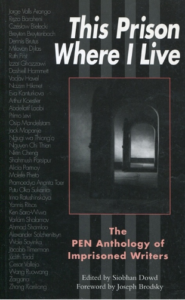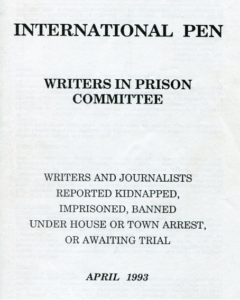PEN Journey 10: WiPC: Beware of Principles
PEN International celebrates its Centenary in 2021. I’ve been active in PEN for more than 30 years in various positions and now as an International Vice President Emeritus. With memories stirring and file drawers of documents and correspondence bulging, I am a bit of a walking archive and have been asked by PEN International to write down memories. I hope this personal PEN journey might be of interest.
In the summer of 1993 before taking over the Chair of PEN International’s Writers in Prison Committee I studied hundreds of individual cases on PEN’s list of over 900 cases which was published twice a year. I studied the regions of the world where conflict was rife, where governments were most oppressive and where writers were most threatened. I also used the time to conceive three long term projects because I knew when the job began, there would be less time for long term thinking.
First, I hoped we could gather the many poems and stories from imprisoned writers over the years and get these published into a book. In studying the cases, I came to understand that those who survived harrowing experiences were often those able to keep their imaginations alive and if possible were able to write. “We lived in Paris in our minds,” one prisoner in dire conditions inside the Western Sahara recounted. A book of these writings would celebrate and inspire and could also be used by PEN centers in their work.
Second, I wanted to convene the Writers in Prison Committees from around the world in a conference to strategize our work. PEN’s other standing committees had such meetings outside of the congresses, but WiPC never had. The PEN congresses were often filled with competing programs and those working on WiPC issues were not always the delegates. We needed to gather and plan together for several days.
Finally, I hoped to expand the roster of Writers in Prison Committees in the PEN Centers so that we could increase the number of members working and the number of writers on whose behalf we worked.
WiPC Coordinator Sara Whyatt and researcher Mandy Garner and I agreed on each of these goals. Every two weeks we met in the large airy WiPC office at the top of the Charterhouse Buildings in London or often at the tea shop across the alley. At the end of our strategy sessions we would discuss how to move forward the longer range goals. I learned an important lesson—first, a goal begins with an idea then is realized by having talented, committed people around. For me that began with Sara and Mandy, who set steps in motion. And then each project found a path forward as people arrived into our circle to help accomplish the tasks.
One day a publisher showed up in our office and asked if we had ever considered doing a book of prisoners’ writings. As a matter of fact…We quickly outlined our idea, put together a team with former WiPC coordinator Siobhan Dowd as editor, and a year and a half later in 1996 This Prison Where I Live was on book stands with selections from more than 65 writers who had been imprisoned, many of whose cases PEN had worked on, from Arthur Koestler to Cesar Vallejo, Alexander Solzhenitsyn, Jacobo Timerman, Breyten Breytenbach, Pramoedya Ananta Toer, Primo Levi, Wole Soyinka, Vaclav Havel, Ngugi wa Thiong’o, Nazim Hikmet, Ken Saro-Wiwa, and many others, current and former writers in prison.

From This Prison Where I Live:
You took away all the oceans and all the room.
You gave me my shoe-size with bars around it.
Where did it get you? Nowhere.
You left me my lips, and they shape words, even in silence.
—Osip Mandelstam, former USSR, 1935
When we shared our second hope for a global gathering, Danish PEN offered to host the conference in Helsingor, the home of Hamlet. With representatives of PEN centers on every continent, this first WiPC conference convened in the spring of 1996. The WiPC gathering has been held biennially ever since at locations around the world. (More on this conference in a later post.)
Regarding the third goal, the number of PEN centers with Writers in Prison Committees has grown each year because of PEN members around the globe. Unfortunately, the number of cases of writers threatened, imprisoned or killed has also continued to grow, but individual cases are released.

In that summer preparing to take over the Chair, my predecessor and mentor Thomas von Vegesack gave me advice I found puzzling at first. He invoked: “Beware of principles!” Thomas was an empathetic and principled man so I was perplexed by his counsel, but over the years I’ve come to understand what he meant. He meant that declarations and statements can often keep you from seeing a way forward and from understanding how to work on a case if you get tangled in abstractions.
There are of course principles that govern our work enshrined in the Universal Declaration of Human Rights. These are fundamental, but Thomas was warning that it is important to understand each situation and not let rigidity, a kind of authoritarianism of principles or political correctness limit.
PEN’s Charter itself contains contradictory concepts. The Charter asserts that PEN members should “use what influence they have in favour of good understanding and mutual respect between nations and people; they pledge themselves to do their utmost to dispel all hatreds and to champion the ideal of one humanity living in peace and equality in one world.”
At the same time the Charter notes that “PEN stands for the principle of unhampered transmission of thought within each nation and between all nations, and members pledge themselves to oppose any form of suppression of freedom of expression in the country and community to which they belong…”
These two ideas of respect and freedom of expression have been challenged more than once, a decade ago in the case of the Danish cartoons. (More on this in a future post.)
Ultimately each PEN member has to resolve the inherent tension. Those from societies with longer democratic traditions are more accustomed to balancing competing ideas; but there are no certain answers. PEN has had lengthy discussions and debates on such questions as “hate speech”—what constitutes it, are there limits to freedom of expression—on slander and libel, holocaust denial, blasphemy.
These challenges for PEN are manifested in individual cases. Early in my tenure as Writers in Prison Chair, one such case blew up quickly, gathering headlines across the globe—the case of Bangladeshi writer Taslima Nasrin. Dr. Nasrin (she was a medical doctor turned writer) had written a novel Lajja (Shame) which described the Muslim backlash against Bangladesh’s Hindu minority after the destruction of a mosque. She was also quoted (misquoted, she said) suggesting that the Koran should be revised in favor of women. An arrest warrant was issued for her; demonstrators called for her death, and at one point snake charmers in Dhaka threatened to release their cobras into the streets if she wasn’t executed. PEN’s Writers in Prison Committee and PEN’s Women’s Committee took up the case, which had bizarre twists along the way.
Next Installment: PEN Journey 11: Death and Its Threat: The Ultimate Censor
Wonderful, Joanne, as ever. These recollections refresh the present. Thank you.
Oh yes, Helsingor. After that congress I wrote a children’s story The Sea Serpent Goes out to Sea, which was about relocating a h sea serpent from some sort of Mexican place who had outgrown her pond, to a place very like Helsingor.
I remember us entertaining each other with our own works in the evening. We had among us all sorts of resources at our disposal.
During one meeting I looked around the table and realized that very few, maybe 7 out of 50, were speaking English as their native language.(and making jokes in it! I rememberr an interchange between Fawzia Assaad and Gustav Murin which was completely hilarious).
In this period I was realizing that English was not just the language of the controversial country to the north and a possible temptation for our betrayal (allegations of someone being like La Malinche, going gringo, continue to bite) but rather an international language in use everywhere.
Dear Joanne,
These memories are so inspiring. Thank you!
The anthology This Prison Where I Live is such an important document. To this day
I’m always giving it away as a present.
Thank you, Jennifer, Lucina and Eric. Thank you too for all the work you’ve done and are doing for PEN.
Thanks a lot, dear Joanne, for bringing us such an amount of PEN life!
Thank you, Teresa.
I join in the pleasure and in the frustration. The pleasure of remembering lost names when they reappear in their context, the frustration and sadness of their disappearance.
Yes, Fawzia. Thank you.